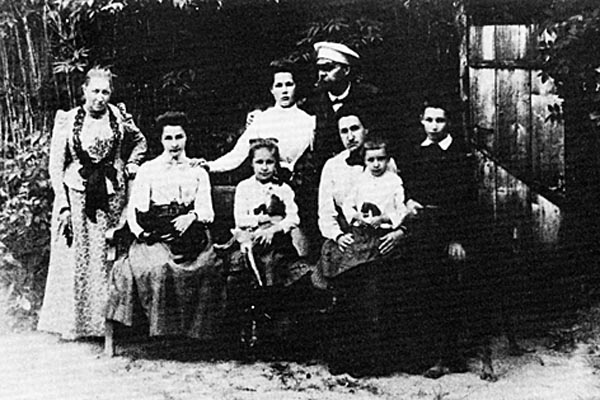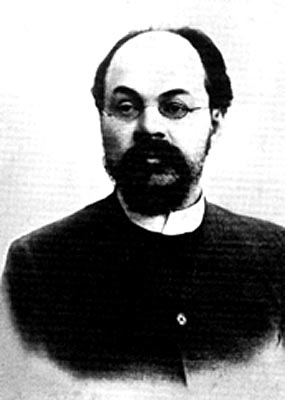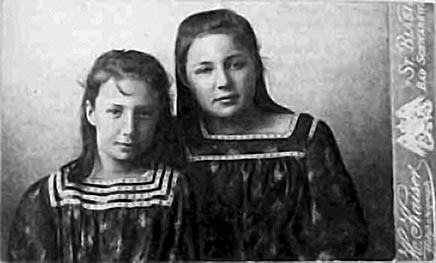-

The Tsvetaevs in the yard at Three-Ponds Lane
Augusta the governess, Valeria, Marina, Mother Maria with Asya in her lap, Andrey,
standing Nadya and Father Ivan, 1901
Childhood
Moscow
8
Tryokhprudny
Pereylok – Three
Ponds Lane
1892
– 1912

|
|
Ты,
чьи сны еще
непробудны,
Будет
скоро тот мир
погублен,
Этот
мир невозвратно
- чудный |
You,
who are still able to dream, |
The house in the very center of Moscow where Marina Tsvetaevea was born at midnight on 8 October 1892, and where she spend the first twenty years of her childhood, is gone, but Tryokhprudny pereulok, Three-Ponds Lane still exists and has retained its name. Valeria Tsvetaeva, her half-sister from an earlier marriage of her father, described the grand bourgeois property:
The
house has eleven rooms. Behind it is a grassy yard with poplars and
acacias, an outbuilding with seven rooms, a coach house, two cellars,
and a shed for horses and the cow. Besides the poplars and the
acacias there was a white lilac bush by the outbuilding and a
snowball-tree by the back door. The best rooms in the house were the
large, high-ceiling, white hall with five large windows and a large
drawing room painted dark red.
The outbuilding was rented to a
family with a shop on Tverskaya Street. They kept a cow. Their Tartar
herdsman blew his horn every morning when he drove the cow to
Petrovsky Park. There was a hundred-year old silver poplar by the
gate, its heavy branches hung out over the street. VS
p.20

|

|
Marina's
mother, Maria Alexandrovna Meyn, the second wife of Ivan Tsvetaev,
had sacrificed her ambition of becoming a pianist to her marriage. A
stern and serious woman of Baltic-German extraction, she was the
opposite of her husband's cheerful first wife. With iron will power
she fought her recurring attacks of tuberculosis. There were few joys
in her house, little laughter, no festivities, a spartan regimen. She
never won the love of her step children. In “Mother and Music”,
Marina would many years later write, “Mother, as it were,
projected her hopes and dreams into her children.” She made
Marina practice the piano several hours a day. Marina obliged
dutifully, but sought escape in poetry, which, from very early on,
she considered her true vocation.
Ivan Vladimirovich
Tsvetaev, an intellectual recluse, was the director of a large
private endowment, which was to establish the first fine arts museum
in Moscow: the “Emperor Alexander III Museum of Fine Arts”,
which would in 1937 be incongruously renamed “Pushkin Museum of
Fine Arts.” A generous and enlightened man he was consummately
dedicated to this work and took only marginal interest in his
children, whose general upbringing he left to the custody of Maria
Alexandrovna and their Baltic-Germann governess Augusta. Yet
he spared no money or effort in their education, tutors, travels to
Europe, and several years of schooling in Switzerland, Germany, and
France.
Marina
inherited her intelligence and irreverent skepticism from him.
A precociously gifted, strong-willed and
sensual
child she was often driven to despair, which the adults saw as
obstinacy. Marina, oppressed by this home, felt that her mother spent
too little tangible affection on her. The lament, “I am alone -
an orphan in this world...” runs through her poems like a
river. At this point in her life this was obviously a product of her
highly sensitive imagination, but she seems to have had no friends
with a similar intelligence and disposition. Her imagination soon
helped her construct an imaginary world that was early on populated
by devils and monsters and later became a highly transcendental
fantasy haven of her very own.

|
In
1894 a sister, Asya-Anastasia (1894-1993!) had been born. Asya was
very different from Marina, she had the practical down-to-earth sense
which Marina lacked and a normal intelligence and imagination. She
admired her older sister boundlessly, and deprived of other playmates
became Marina's closest friend. Asya left a diary of their childhood,
which is of invaluable help to our understanding. In the summers of
their childhood the whole family moved to a rented house in Tarusa
near Moscow. Marina's paradise, where they were allowed to play with
other children, and the daily routine was less strict. There Marina
could freely indulge in writing poetry to her heart's and soul's
delight.
Her mother had been fighting a recurring
tuberculosis since 1902. As a last resort Ivan took the family to
Nervi, Italy during the winter of that year. Subsequently they lived
for some time in Yalta. Between 1903 and 1905 Asya and Marina were
sent to boarding schools, first in Switzerland then in Germany.
Language tutors taught them when in Moscow. They spoke German,
Italian, or French in the family at home and Russian with the service
personnel and on the street. In her Reminiscences
Asya
describes their life in Moscow and Tarusa, in Italy and Germany, the
ups and downs of her mother's illness, the schools, and again and
again her nearsighted but always admired older sister. She attributes
Marina's often vacant look to her nearsightedness. Apparently she
could read at close range, but beyond her book the world was a blur,
which might explain many of her peculiarities.
And then at
Tarusa, in July 1906, after many a false alarm, Maria Alexandrovna
died. While Asya described the day in minute detail, Marina
left us only one distressing poem.
|
Мame |
To
Mama |
They returned to the big house on
Three Ponds Lane, which now seemed empty. Their father buried his
grief in his work. A theft from the museum roused Ivan's enemies and
the envy of the imperial administration. Their accusations hurt him
deeply and aged him. Over his desk he had hung a photo of Maria in
her coffin, which fascinated and frightened the girls. There is a
poem by Marina (1913) which seems to reflect this photo.
None
of their relatives offered to take in the two orphans. They were
considered too difficult. Marina was sent to a private boarding
school (Vonderwies) in Moscow. She only came home on weekends. Ivan
finally hired Varvara, an old teacher of his daughters from their
Yalta days, to be their companion and run the household. Varvara did
not succeed to regain Asya's and Marina's affection. Asya asks
herself why: “This is one guilt that weighs on me, and that I
cannot explain.” The wounds were too deep. After a few months,
Varvara quit her job and returned to the Crimean.
Marina
hated school, it bored her. She attached herself to a group of
long-haired co-students who considered themselves “revolutionaries”.
At the end of the year the school expelled her. She never mentioned
this experience. “Anger was Marina's element. Her other was
shyness. She could barely control the torments caused by
embarrassment,” writes Asya. “She would blush to the
roots of her hair. If this happened before the prying eyes of a
poetry-reading, she would hauntingly walk to her execution, livid
with disdain. Had she raised her cast-down green eyes, she would have
appeared like Medusa.”[ASYA]
a - At seventeen Marina began to smoke, a habit that never left
her.
In 1909 her father allowed Marina (17) to enroll in a
summer course at the Sorbonne, her dearest wish. For the first time
she went alone abroad. During the past year she had translated Edmond
Rostrand's verse drama L'Aiglon.
Now
she saw the aging Sarah Bernhardt in
the main role of the Duke of Reichstadt (Napoleon II) and fell in
love with her, Reichstadt, and Napoleon I, his father. These
infatuations became her precious treasures, all consuming, she kept
them from everyone. - Until she placed a picture of Napoleon in the
icon corner in her room. “Father became very angry when he
noticed this sacrilege by accident, demanding the removal of
Napoleon's picture. Marina in blind anger, grasped a heavy candle
holder and was about to smash the arrangement - when father turned
around and left her room wordlessly.” [ASYA]
Part of the summer 1910 they spent in Tarusa, which repaired
the fractured relationship between the sisters. Afterward Marina and
Asya were sent to a new school. A close friend of the family offered
to take care of the house, if Ivan Tsvetaev would marry her. The
wider families raised a howl, and Ivan had to abandon this hope. When
not in school the girls did as they pleased.
Marina had her
poems published by small Mamontov Press. She paid for the printing
herself, carefully selecting the paper and the dark-green binding.
“Evening
Album” became
an unexpected success. Soon she was asked to read her poems to the
“Circle for Literature and Art” in a private house.
Mayakovsky and Maximilian Voloshin were among her audience. Bryusov
presided.
|
|
To control her shyness she had persuaded Asya to come along for support. Together as one voice the two recited several poems. “The applause was thunderous,” reports Asya, “an absolute no-no in this honorable circle.” [ASYA] Gumilev reviewed Evening Album as new voice of great independence, even Bryusov found some kind words. She was given the first and only prize in her life.
|
|
|
|
|
She didn't realize how close she was to finding the love she was craving for.
|
...Послушайте!-
Еще меня любите
- |
...Listen!
- Would someone love me - |
Her new friend would become Maximilian Voloshin. Asya described his first visit to Three Ponds Lane: “I had never seen a man like him. I observed him carefully. He was not tall but huge. A non-human head on broad shoulders. Father Zeus in Papa's study. A mountain of curls. The beard flowing from the crater of his head like hot lava. His hair chestnut brown with traces of red. His eyes scrutinized me, reached deep into my soul...” [ASYA] Marina read her poems to him. Voloshin was the only person who took the childish and the poetic side of Tsvetaeva equally seriously. With a warm, understanding smile, he talked about his house in Koktebel - and invited them for the summer of 1911. Their friendship would last unbroken until his death in 1932.